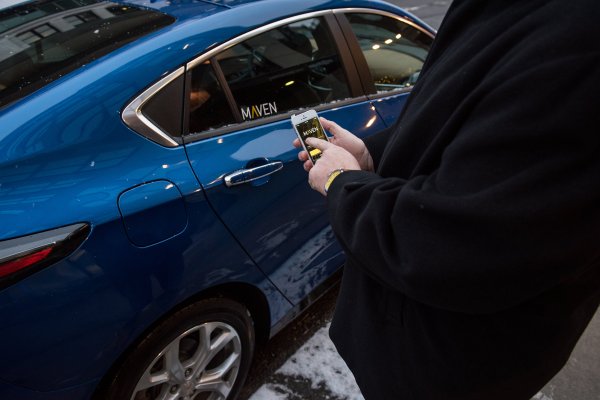GM has launched its first major international city for its Maven car sharing product. The service is going live in Toronto, Canada’s largest city by population, with rates beginning at $9 per hour which include gas and insurance coverage. The launch follows a prior pilot in the Waterloo region nearby, but Toronto is the first launch at scale Maven has undertaken outside of the U.S. since launching two years ago.
The car sharing service began as a sort of internal startup at GM, spinning up with leadership from a number of other shared-use consumer vehicle platforms, including Zipcar. The model is similar, too, offering round trip, on-demand use of cars with convenient pick-up locations dotting parking spots among popular city neighbourhoods.
Toronto made good sense for Maven’s next big expansion for a number of reasons, according to Maven and GM Urban Mobility VP Julia Steyn. She explained in an interview that Toronto has a good mix of the factors that contribute to making sure services like car sharing are in demand.
“We’re among a lot of like-minded companies here, there’s a huge tech boom in the city,” Steyn said. “And frankly, for better or for worse, Toronto’s issues with congestion and people not wanting to own vehicles is not unique to many other large cities. We always wanted to have a large-scale deployment and Toronto will afford us that.”
Maven’s debut in Toronto is staring with its Maven City consumer-facing vehicle sharing service, which as mentioned is similar to Zipcar and other equivalent services. Users don’t need to pay any kind of membership fee, and there will be 40 vehicles to choose from in the fleet at first, including a range of Chevrolet, GM and Cadillac cars. Every car also includes a full suite of technology features, including OnStar, Wi-Fi, CarPlay and Android Auto.
“It’s been clear for a long time that in urban cities, people don’t want to be tied to an expensive asset that sits idle,” Steyn explained, regarding the appeal of the platform especially in urban settings, and with younger audiences. “We have not really set ourselves a goal of going after millennials, but it’s just natural that people who are very comfortable with technology and very comfortable with interacting with mobile devices come to us. ”
GM has now turned Maven into a mobility brand with a range of different service offerings, including Maven Gig, which aims to provide on-demand vehicles specifically for use by gig economy workers, including Uber and Lyft drivers, and those working for on-demand service delivery platforms. Maven City is the only product offering coming to Toronto at launch, though others may follow depending on how this launch goes.
Cars on the Maven platform will be available to book using the app and pick up from spots in Bloor West Village, Liberty Village, King West, the Entertainment district, City Place, Yonge and Eglinton for the Midtown crowd, Leslieville, at Ryerson University, on the Danforth, in the Financial District and at the Eaton Centre, so Toronto residents from various parts of the city should have a chance to try it out.
“We have been growing 10 times month over month, so we now have 250 million Maven miles [driven],” Steyn said. “I think the goal is very simple, and it is to remove barriers from sharing in the broader sense.”
